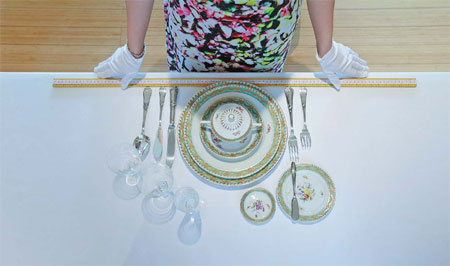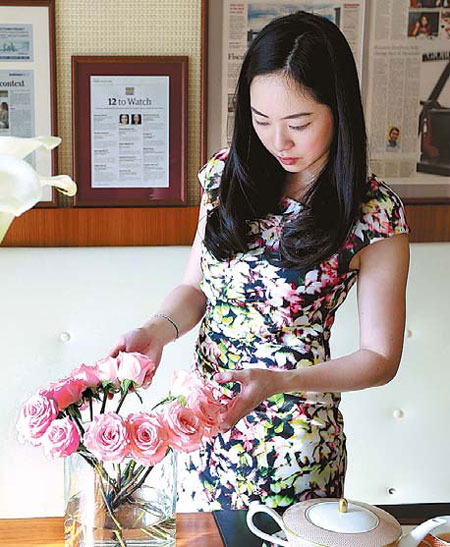Learning to be a perfect lady proves fruitful
Updated: 2013-05-31 07:49
By Cang Wei and Song Wenwei (China Daily)
|
||||||||
Outdated expectations?
In 2006, Zhao Ruoqiong, a 42-year-old in Suzhou, Jiangsu province, spent about 40,000 yuan to send her daughter, then aged 8, to a private school to attend a course called "Becoming Little Ladies". The girl learned ancient Chinese poems, played chess and studied embroidery.
"I don't care what she really learned," said Zhao. "Personally, I think peeling oranges with a knife and fork and walking around with books on the head are too flashy. I just hope that she can grow up to be an adorable, elegant woman who knows how to treat the people around her properly. You can't choose your appearance, but you can choose what kind of person you want to become," she said.
 |
|
How to set a table correctly is one of the skills women learn at the Institute Sarita finishing school in Beijing. Photo by Wu Hailang / for China Daily |
Zhao, a successful real estate developer, added that, like many women of her generation, as a child she was taught to act like a boy and ignore her female characteristics.
"I didn't enjoy my childhood and adolescence, and that is part of the reason I want my daughter to receive an education designed for girls, to fully develop her nature and show her femininity," said Zhao.
"I've forgotten most of the etiquette I learned when I was little, but there are some things I'll never forget," said Zhao's 15-year-old daughter, Chen Can. "It was the beauty, the politeness and elegance that impressed me the most, it wasn't pretentious or stiff, but genuine and comfortable."
Chen said that the course also opened a new world for her. "I learned how to make Chinese ink paintings and play the violin, which are so much fun and make my life so fulfilled."
Stereotypes
However, some scholars have expressed concerns about the spread of girls-only schools and "ladylike education", saying that they may promote a number of problems, such as a lack of interpersonal skills when the girls communicate with the opposite sex and the resurgence of traditional, but outdated, expectations that men hold for women.
"The stereotypical female education, designed to produce women who conform to the designated roles of obedient housewife and diligent mother, should not be encouraged," said Guo Weiqi, a professor at the College of High Vocational Technology at Wuhan Textile University, the first college in the central Chinese city to offer etiquette courses.
 |
|
He Peirong demonstrates flower arranging at Institute Sarita, a finishing school in Beijing. Wu Hailang / for China Daily |
"In fact, that kind of education obliterates women's values and attractiveness. The most important thing that education for girls should do is develop their confidence, to let them have faith in themselves."
"It's worth trying to introduce schools for girls, but the comprehensive schools which admit both sexes have become mainstream in China," said Jin Yihong, professor of women's studies at Jinling College.
She said that generally boys and girls assume different "gender roles", and that, compared with single-sex schools, mixed comprehensives provide more opportunities for children and teenagers to understand gender identity and related modes of thinking, which will help naturalize communications between the sexes.
Principal Chen Zhongxiang said that concerns about potential communication problems in later life are unnecessary, because girls and boys can interact after school, and single-sex schools will always cooperate with comprehensives to allow girls to become acquainted with male students.
Professor Xiong Bingqi is keeping an open mind about courses that prepare women for marriage to wealthy men.
In some cities, such as Chengdu and Beijing, many women, mostly white-collar workers, attend courses such as "Factors existing in relationships with successful men", "Wealthy men's general requirements for their future wives" and "How to create chances to date rich men".
"Rather than considering it a gender-biased education, I prefer to believe that it results from people's needs," said Xiong. "As long as it meets those needs, it should be allowed to exist and operate in accordance with market-based mechanisms. The diversity of the education is the most important thing."

 Michelle lays roses at site along Berlin Wall
Michelle lays roses at site along Berlin Wall
 Historic space lecture in Tiangong-1 commences
Historic space lecture in Tiangong-1 commences
 'Sopranos' Star James Gandolfini dead at 51
'Sopranos' Star James Gandolfini dead at 51
 UN: Number of refugees hits 18-year high
UN: Number of refugees hits 18-year high
 Slide: Jet exercises from aircraft carrier
Slide: Jet exercises from aircraft carrier
 Talks establish fishery hotline
Talks establish fishery hotline
 Foreign buyers eye Chinese drones
Foreign buyers eye Chinese drones
 UN chief hails China's peacekeepers
UN chief hails China's peacekeepers
Most Viewed
Editor's Picks

|

|

|

|

|

|
Today's Top News
Shenzhou X astronaut gives lecture today
US told to reassess duties on Chinese paper
Chinese seek greater share of satellite market
Russia rejects Obama's nuke cut proposal
US immigration bill sees Senate breakthrough
Brazilian cities revoke fare hikes
Moody's warns on China's local govt debt
Air quality in major cities drops in May
US Weekly

|

|








